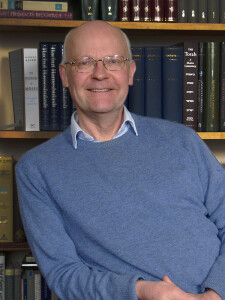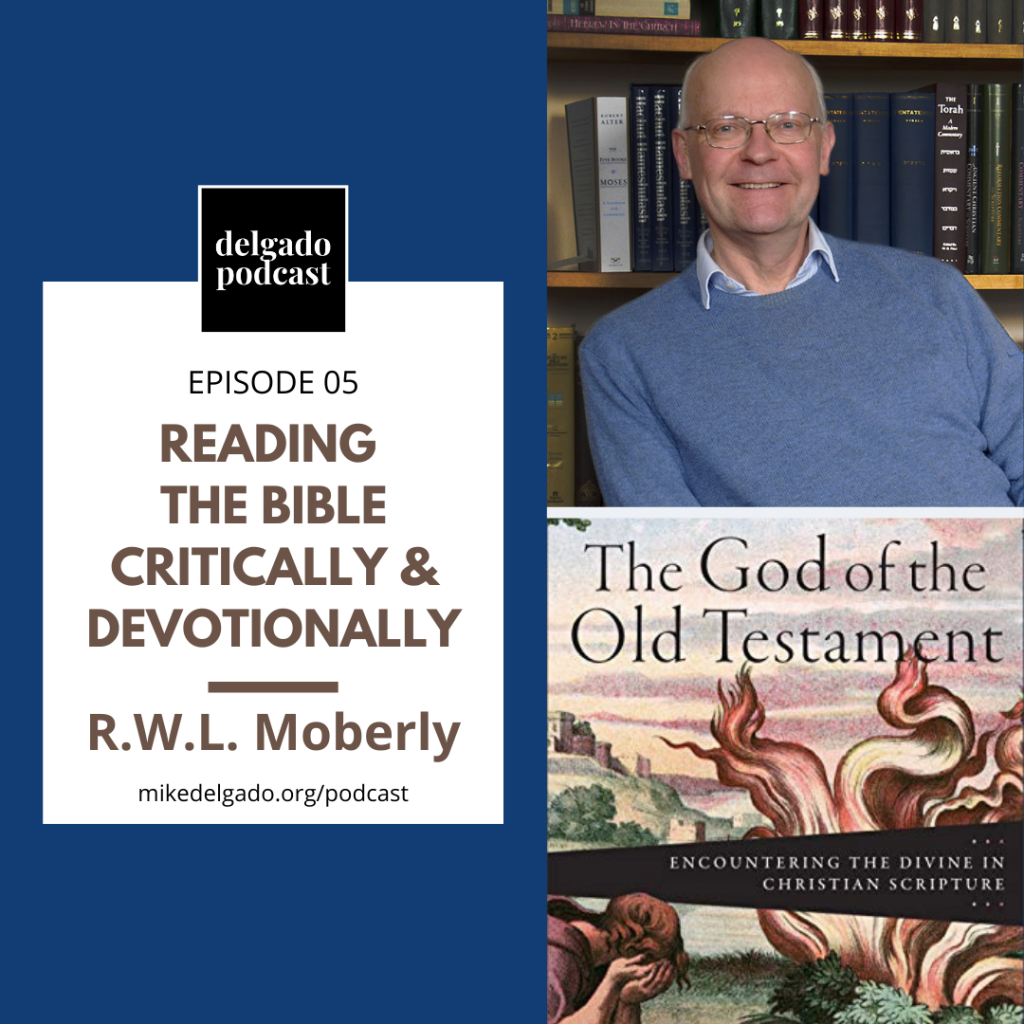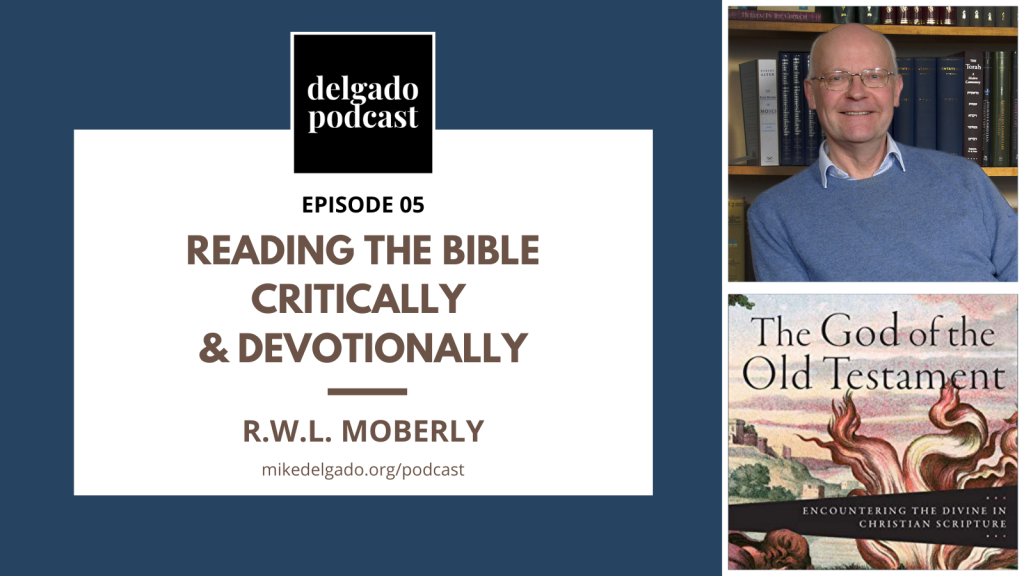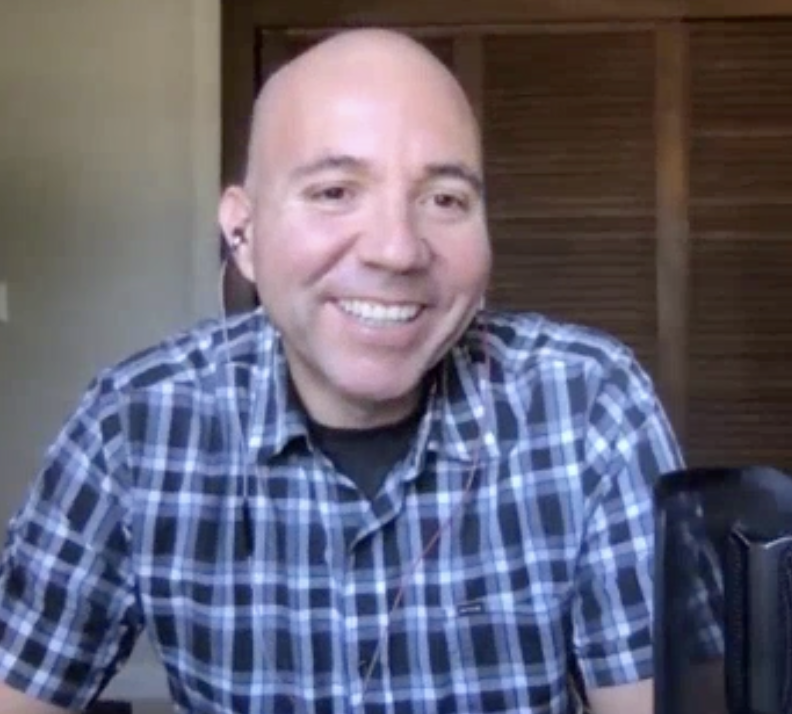 We’re honored to learn from Dr. Walter Moberly about ways to understand the Old Testament — and to learn about his upcoming book: The God of the Old Testament: Encountering the Divine in Christian Scripture, wherein he writes about eight key Old Testament passages that give us insights into the nature of God in Christian Scriptures.
We’re honored to learn from Dr. Walter Moberly about ways to understand the Old Testament — and to learn about his upcoming book: The God of the Old Testament: Encountering the Divine in Christian Scripture, wherein he writes about eight key Old Testament passages that give us insights into the nature of God in Christian Scriptures.
Dr. Moberly is a brilliant theologian and very humble professor of theology and Biblical Interpretation at Durham University — and it was a thrill to be able to chat with him about his thoughts on the Old Testament and ways to read the Bible critically and devotionally.
One memorable quote from today’s episode is when Dr. Moberly recounted how Keith Sutton encouraged him to explore the Bible:
“The Bible is not a fortress to be defended, but a mansion to explore, to live in and invite others into.”
It’s a powerful way to think about the adventure of reading the Bible. And, Dr. Moberly certainly invites us all in to seek the richness, beauty and mystery of Scripture in this conversation.
You can subscribe or download this episode on iTunes, Spotify, Google Podcasts or Stitcher. You can also watch or subscribe to the video series on YouTube.
Here are overviews of the episodes:
Part 1: Reading the Bible Critically & Devotionally
In this episode, we chat with Dr. Moberly about his spiritual journey — and what led him from studying the classics and ancient languages to pursue Biblical studies and ordination in the Church of England. He also talks with us about how he applies critical analysis to the Bible — while also understanding the Bible spiritually.
He then shares with us examples of how he applies his academic and spiritual insights to Old Testament stories like the Conquest of Canaan, The Story of Rahab, The Book of Jeremiah and the Laments in the Psalms. It’s a blessing to hear how he has prayerfully read and applied scholarly analysis to these popular Biblical passages.
Listen to part one:
Part 2: Reading the Bible Critically & Devotionally
In this episode, Dr. Moberly talks with us about the importance of grief and laments in the Old Testament — and how these passages can speak to us during our own grieving processes. He also shares why Scripture reading should be an adventure and how the Bible expresses truth in a variety of ways: poetry, narrative, stories, humor and even through intentional contradictions. Toward the end of our conversation, Dr. Moberly gives advice for some favorite Old Testament books to read first — as well as some encouraging words about returning to a second simplicity.
Listen to part two:
Some takeaways from these discussions:
- The Bible is a mansion to be explored. Dr. Moberly has lived most of his life exploring the mansion of scripture and he invites us all to live in the mansion, too — and to enjoy the process of reading and studying the Bible. There are rooms of lament, rooms of beauty, rooms of questions, rooms of wisdom, mazes of mysteries — and that is all part of the journey of exploring the Bible. The mansion is open to us all, we just need to step inside and start opening the doors.
- Let’s avoid becoming schizophrenic readers of the Bible. Dr. Moberly shared why it’s important for us to read the Bible critically as well as spiritually — and his academic work as a scholar and theologian reveals how he has brought these two worlds together as he helps us to see the beauty and complexity of scripture. He has given us a model of how to read and understand the Bible with both academic and spiritual glasses on. It’s definitely not easy to do, but he has given us a map with the books and research he has done.
- Puzzling passages require us to look more deeply at the themes and/or purpose on why the story is included. Serious readers of the Bible shouldn’t toss out texts that don’t make sense, but rather think critically on why these stories were passed along and what themes or point the author was trying to make. Thankfully, we have academic commentaries and study tools that can help us read different perspectives and interpretations on the puzzling verses.
- Explore the intentional discrepancies in Biblical texts. Sometimes we try to explain away or don’t want to think about the discrepancies in the Bible — or how different Biblical authors might contradict each other. It’s part of the dialogue of ancient writers and should be explored and embraced, not shunned and tossed out. The Bible gives us two different creation accounts in the first few chapters of Genesis alone. The Bible isn’t hiding different perspectives — and uses different literary forms to share ideas and themes. It’s part of the beauty of reading the Bible and it’s our job to explore, embrace and keep the questions going.
- Recover the Biblical themes that matter most and hold on to the simplicity. Dr. Moberly reminds us about returning to a second naivete, which refers to those simple truths that speak to us in scripture — and to remember those Biblical themes of trust, hope, love, goodness, mercy, justice. These are beautiful gems that you’ll find in scripture and meant to be taken and held onto. These are the keys that can help bring us light in dark seasons and deep hope amid times of grief and sadness. It also gives us hope in God
Video of part one of our conversation:
Video of part two of our conversation:
Growth Question
What is a Biblical story that has caused you the most frustration — and what can you do to better explore that particular room? I’m not saying you’ll find a clear or satisfactory answer, but what are ways you can find out different points of view on it to possibly help with your understanding. Let me know by commenting below or messaging me on Instagram or Twitter @DelgadoPodcast.
R.W. L. Moberly
Walter Moberly is an English theologian and professor of theology and Biblical interpretation at Durham University. He earned his M.A. at Oxford University and an M.A. and Ph.D. at Cambridge University. He is also an ordained priest in the Church of England. He is known for his creative, accessible, and provocative writing. Some of his books include: The God of the Old Testament, Old Testament Theology, The Bible in a Disenchanted Age, and The Theology of the Book of Genesis.
Share on Instagram:

Share on Twitter:

Check out more episodes from the Delgado Podcast.
To keep up with this weekly podcast series featuring academics, authors and artists who challenge us, you can get updates on Instagram and Twitter or subscribe to the video interviews on YouTube. Reach out with any suggestions for authors to feature, topics to discuss and share your thoughts on an episode.

